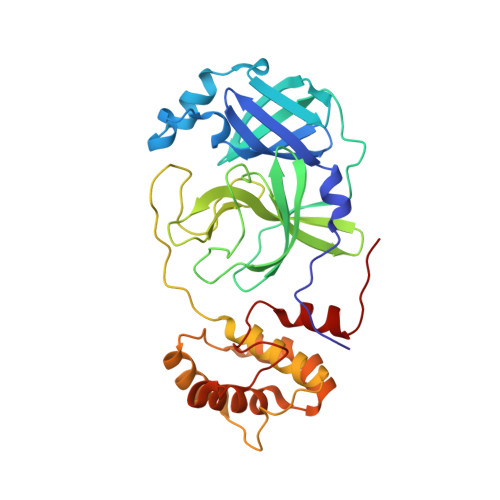Improved SARS-CoV-2 M pro inhibitors based on feline antiviral drug GC376: Structural enhancements, increased solubility, and micellar studies.
Vuong, W., Fischer, C., Khan, M.B., van Belkum, M.J., Lamer, T., Willoughby, K.D., Lu, J., Arutyunova, E., Joyce, M.A., Saffran, H.A., Shields, J.A., Young, H.S., Nieman, J.A., Tyrrell, D.L., Lemieux, M.J., Vederas, J.C.(2021) Eur J Med Chem 222: 113584-113584
- PubMed: 34118724
- DOI: https://doi.org/10.1016/j.ejmech.2021.113584
- Primary Citation of Related Structures:
7LCO, 7LCR, 7LCS, 7LCT, 7LDL - PubMed Abstract:
Replication of SARS-CoV-2, the coronavirus causing COVID-19, requires a main protease (M pro ) to cleave viral proteins. Consequently, M pro is a target for antiviral agents. We and others previously demonstrated that GC376, a bisulfite prodrug with efficacy as an anti-coronaviral agent in animals, is an effective inhibitor of M pro in SARS-CoV-2. Here, we report structure-activity studies of improved GC376 derivatives with nanomolar affinities and therapeutic indices >200. Crystallographic structures of inhibitor-M pro complexes reveal that an alternative binding pocket in M pro , S4, accommodates the P3 position. Alternative binding is induced by polar P3 groups or a nearby methyl. NMR and solubility studies with GC376 show that it exists as a mixture of stereoisomers and forms colloids in aqueous media at higher concentrations, a property not previously reported. Replacement of its Na + counter ion with choline greatly increases solubility. The physical, biochemical, crystallographic, and cellular data reveal new avenues for M pro inhibitor design.
Organizational Affiliation:
Department of Chemistry, University of Alberta, Edmonton AB, T6G 2G2, Canada.















